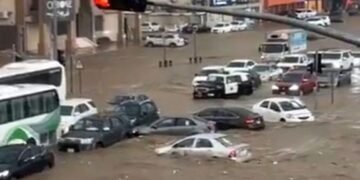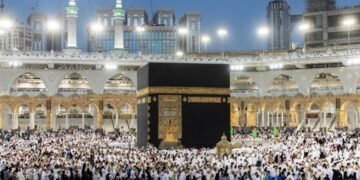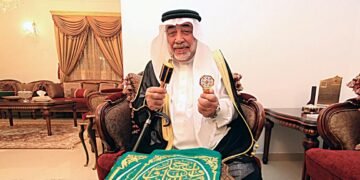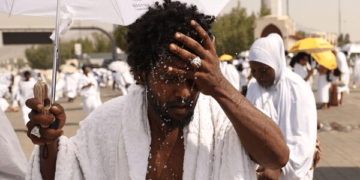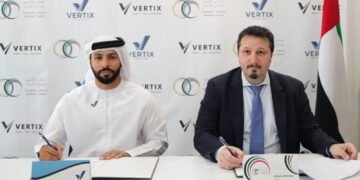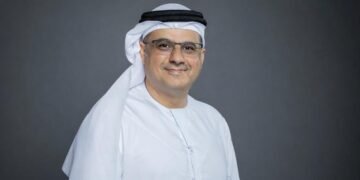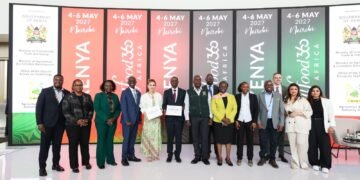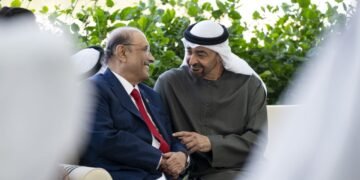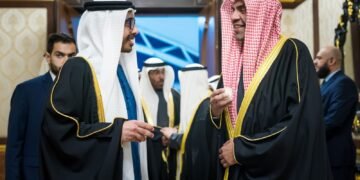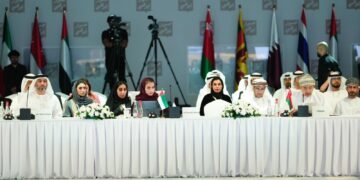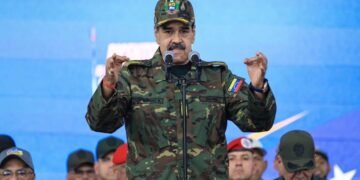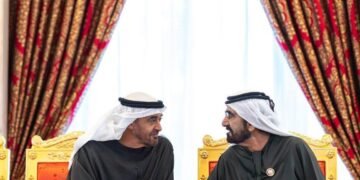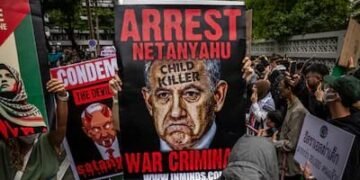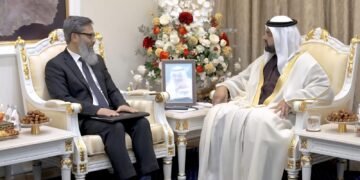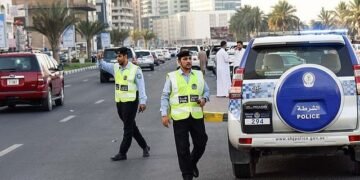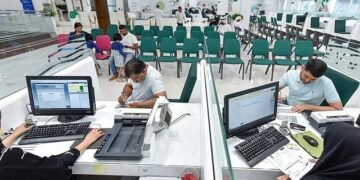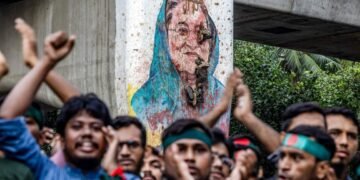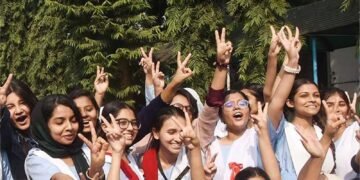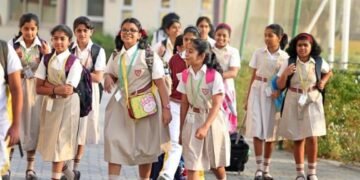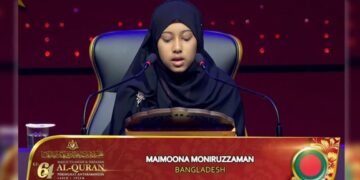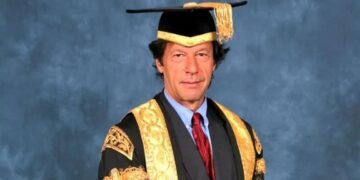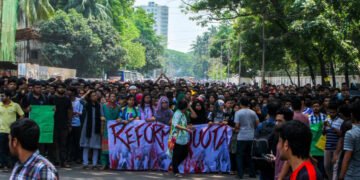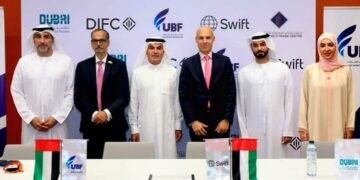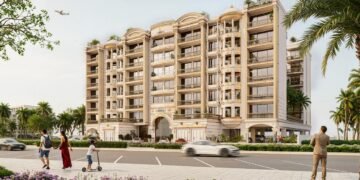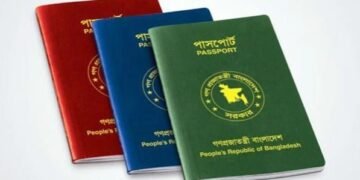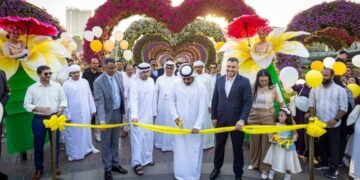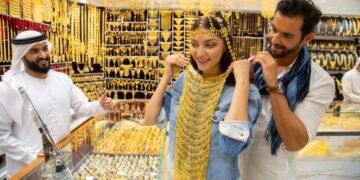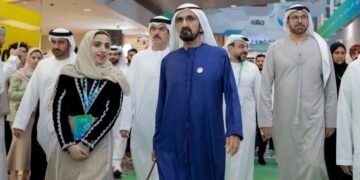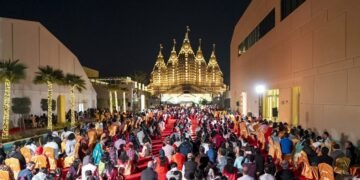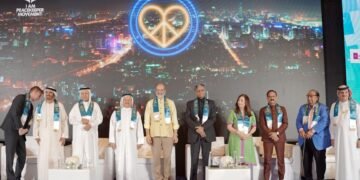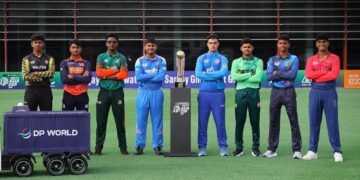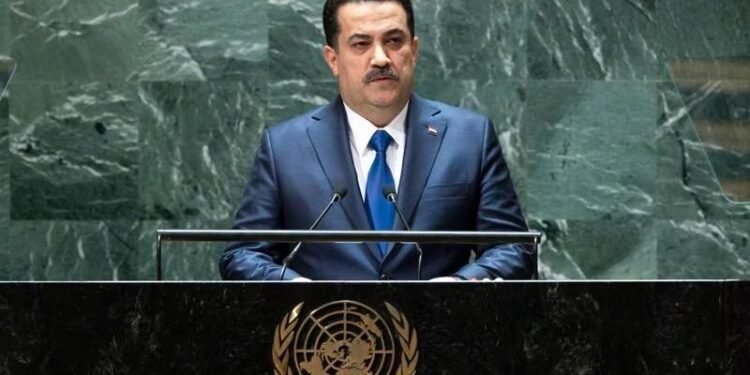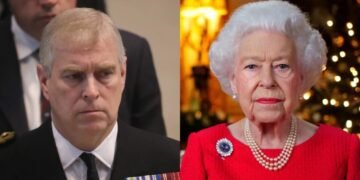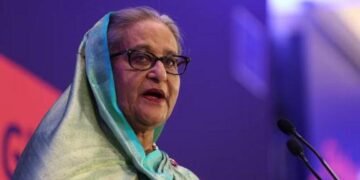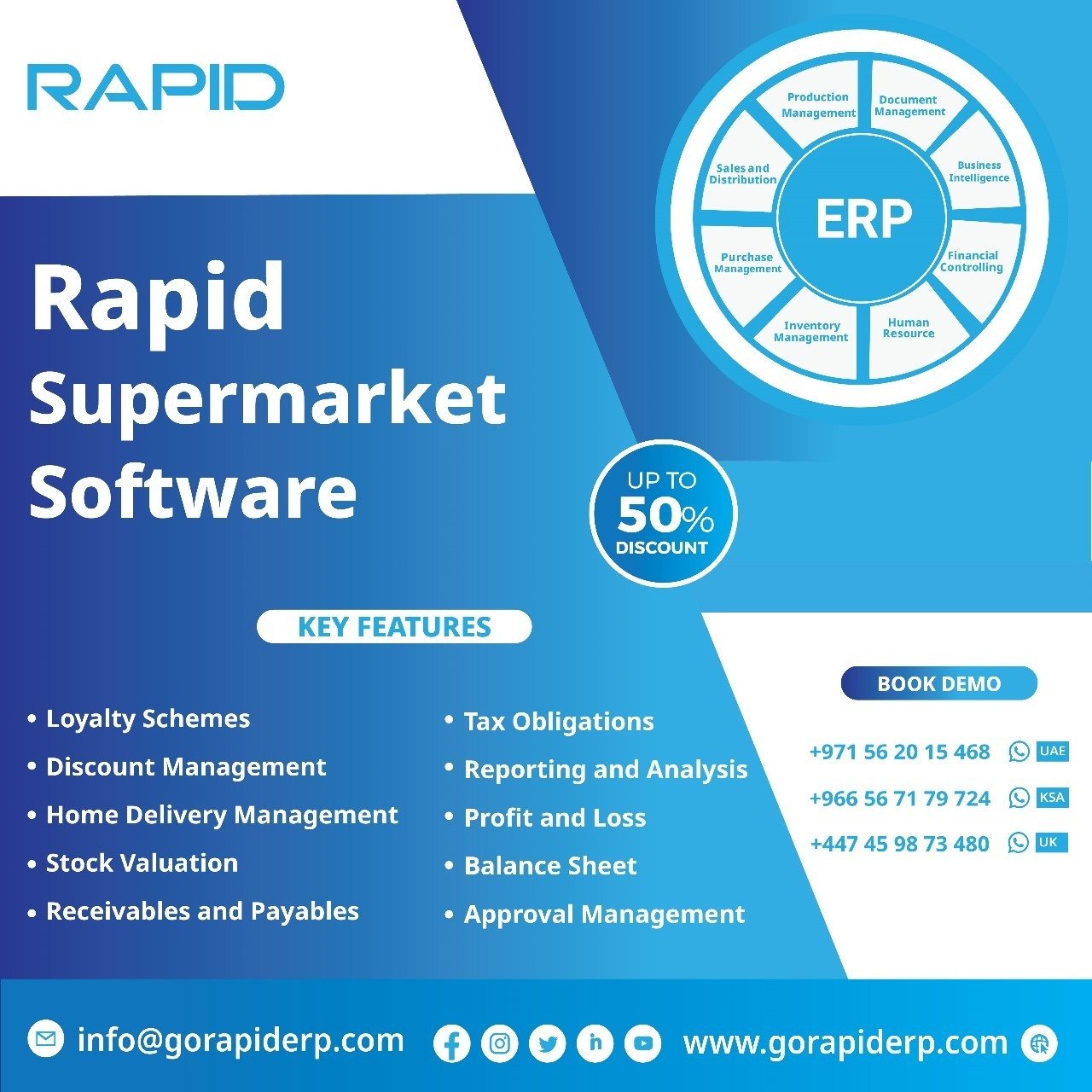Speaking in New York during the UN General Assembly, he told: his government is committed to the sovereignty and territorial integrity of Kuwait
“Gaining the trust of the people”. That is how Iraqi Prime Minister Mohammed Shia Al Sudani described his biggest challenge since assuming office 10 months ago.
While economic woes, climate change and threats to security are all obstacles that Iraq must tackle, Mr Al Sudani stressed that regaining the trust of the people represents his government’s biggest challenge.
In an extensive interview in New York during his participation in the High Level Week of the United Nations General Assembly, Mr Al Sudani spoke of his commitment to improving the lives of Iraqis, with priorities that include “providing basic services, fighting corruption [and] undertaking economic reforms, which can all strengthen the confidence of people in this political system”.
He added that trust is only restored “through credibility and fulfilling promises. If we succeed in that, all other challenges can be met”.
Mr Al Sudani said that his government is strong and able to deliver, despite facing many challenges.
He described his government’s foreign policy as “balanced, independent with sovereign decision-making, far from the desires and interests of others”.
He went on to say that “there is no problem in [serving] mutual interests but not at the expense of Iraq”.
Surrounded by six neighbours with which his country has had a chequered history, Mr Al Sudani said Iraq’s fate is that it is “a point of convergence of all those in the region”.
He stressed that all countries would benefit from his nation being stable.
“Disruption in Iraq brings disturbances in the region and the world, as we saw with ISIS,” he said.
His government is seeking to create joint projects in the region to build on possible cooperation such as the “Iraq development road project”, which he has invited countries in the region to join, strengthening the links between Asia and Europe.
‘We will not be part of any sphere of influence’
Mr Al Sudani’s trip to New York included meetings with US Secretary of State Antony Blinken and White House Coordinator for the Middle East, Brett McGurk.
Mr Al Sudani said that he told US officials that his country’s relationship “should not be only within a security dimension … while we are open to bilateral security co-operation”, highlighting the importance of “Iraq’s independence and we will not be part of any sphere of influence”.
One issue that has been raised is the presence of foreign troops in Iraq.
“We are not in need of combat troops; what we have are military advisers, but even their presence needs regulation, in terms of their size, location and how long they remain,” he said.
He added that there needs to be a “clear timeline” for the continued presence of foreign troops.
“This is part of what is needed for our sovereignty and stability, to take away any excuse from those who demand keeping arms out of the control of the state because of the presence of foreign troops”.
The US extended an official invitation for Mr Al Sudani to visit Washington, a matter that had been pending for several months. And while that was seen as a win, a build-up of tensions with Kuwait came to a head in New York as the Kuwaiti government raised concerns about Iraq seeming to renege on previous maritime border demarcation agreements.
Clear concern was expressed by Kuwait and supported by the countries of the Gulf Cooperation Council over Iraq’s Federal Supreme Court move to void the 2012 Kuwait-Iraq Agreement, which aimed at setting the maritime boundaries of Khor Abdullah.
In a joint statement after their meeting in New York last week, the GCC and US said “the ministers stressed the importance of Iraq’s commitment to Kuwait’s sovereignty, territorial integrity and respect for international conventions and UN resolutions, especially UNSC Resolution 833 regarding the demarcation of the Kuwait-Iraq boundary”.
The US and GCC statement called on the Iraqi government to “ensure that the agreement remains in force”.
Mr Al Sudani faces domestic pressure from some political parties to challenge the agreement on the maritime boundaries, and regional pressure to respond to the Federal Supreme Court’s ruling, which Kuwaiti Prime Minister Sheikh Ahmad Nawaf Al Sabah said “contains historical fallacies”.
Responding to questions about this issue, Mr Al Sudani toldthat “in Iraq, there is a division between the various branches of power”, deflecting the issue as a judicial one.
However, he stressed that his government is “committed to international laws and the decisions of the UN Security Council, in addition to the sovereignty and territorial integrity of the state of Kuwait”.
He spoke of his meeting with Kuwait’s Prime Minister saying: “I confirmed to him our government’s position and expressed Iraq’s desire to continue the work of the joint committees and to have ongoing mutual visits between the officials and experts of the two countries, across all fields, in order to strengthen the levels of cooperation and building of trust”.
Mr Al Sudani stressed his commitment to “improving our ties and overcoming all hurdles” between the two countries.
He acknowledged the concerns that Kuwaitis have, given the memories of the 1990 invasion.
Mr Al Sudani said “Iraq after 2003 is completely different from Iraq before [that time]. We are working now at setting up cross-border projects and developing ties with all our neighbours, including Kuwait”.
As for relations with the Gulf more generally, which have been growing in the past despite concerns about the Kuwait dynamics, Mr Al Sudani said that the GCC countries are active in Iraq through investment projects and active participation in the Baghdad Conference, which also involves Jordan, Iran, Turkey, France and others.
The conference will have “a new vision, one based on economic integration which can further regional stability and joint infrastructure, in addition to other measures”, he added.
In the spirit of improved relations in the region, Mr Al Sudani stressed his firm belief that “Syria with its current political make up and people is better than an unknown alternative that could lead the region to enter a new war in the region”.
He added “any security disturbances in Syria can lead to ISIS being unleashed. We need to re-engage Syria and meet its people’s needs”.
And yet there are tensions with both Iran and Turkey with regular air strikes on Iraqi territories, particularly targeting dissident Kurdish groups.
Mr Al Sudani said: “We are dealing with this matter through diplomacy, and our rejection of violence or the threat of violence. Our ability to respond is there, but we prefer diplomacy”.
He added that “we have emptied the camps of [Iranian dissident] armed groups, which is part of our constitutional obligation not to allow the use of Iraqi territory to attack another country”.
Mr Al Sudani explained that there are now Iraqi troops monitoring the borders in the Kurdistan Region.
‘There is a real war against corruption’
His primary concern for the moment is domestic affairs.
Iraq faces a significant challenge as 16 per cent of its population lives below the poverty line, according to the Iraqi government’s statistics.
He was keen to stress that “the best implementation of social security net is in Iraq … this is internationally recognised for dealing in a multi-faceted way”.
He added “this government’s 2023 budget set aside $4 billion for cash support for individuals and families below the poverty line, and 1.7 million individuals and families are included in this programme”.
Each of those gets an average of $200 a month, and added financial support for students as “battling poverty is not just about income, it is about education, health, society … we do not want poverty to be inherited”.
Tackling poverty and providing basic services is part of Mr Al Sudani’s effort to “end poverty in Iraq within five years”.
That pledge is one of several Mr Al Sudani is making in order to win over Iraqis’ confidence. However, this cash support puts a strain on Iraq’s budget in addition to paying public sector salaries.
And so, Mr Al Sudani sees a vital role for the private sector.
He explained that “previously we could pay compliments to the private sector and rely on oil revenues, but in 2020 we had a violent shake up.
“In February [of that year], Iraq’s revenues from oil were at $1.5 billion, while $4.5 billion was needed to cover [public sector] salaries, meaning we had to borrow $3 billion”.
One of the biggest impediments facing the private sector is corruption – a matter that Mr Al Sudani acknowledges.
“There is a real war against corruption, on a daily basis we are working to recover funds and recover those who took the funds … we follow up on all information, even a statement post on social media”.
Responding to those who question how effective the fight against corruption, Mr Al Sudani said there is no “political manipulation when it comes to corruption … we are fighting it in reality, not only in media statements”.
Mr Al Sudani’s government is working on the imposition of corporate tax, digital payments and securing customs payments. Focusing on a singular dollar exchange and using the dinar for internal economic activity are also part of the government’s efforts. He also said that the banking system has major issues that need tackling.
He added “reforms are like a difficult medicine that the patient must take to get better … the fluctuations in the Iraqi dinar’s value are a result of a battle between the Iraqi government which seeks to secure legitimate transactions and a group that benefits from the dollar exchange”.
While Iraqis often complain of inflation, Mr Al Sudani insisted that “all goods have maintained their prices as all traders have to take the dollar through the government system … those who seek alternative routes are the smugglers”.
Mr Al Sudani spoke at length about illicit trade in Iraq, including the role of those who smuggle US dollars to Iran.
“Our trade with Iran is approximately $11 billion, but Iran is sanctioned, which means a trader cannot send funds to Iran in return for goods as that is prohibited, so the trader goes to the parallel [black] market”.
The Iraqi central bank is working with its Iranian counterpart to address this issue, “an important part of controlling the price of the currency rests on regulating our trade with Iran”.
He added there had also been problems of informal transfers to Turkey for trade, but now the Iraqi government has mandated transfers are to be completed through the banking system.
The prime minister is also attempting to tackle illicit tobacco trade, which he says must be brought under control.
“We get zero tax revenues from tobacco trade, and yet from Mosul to Basra, tobacco products fill the stores … they are coming in from illegal trading routes”, primarily through the Kurdistan region of Iraq, “with whom we are working to close this loophole”.
On Iraq’s internal politics, Mr Al Sudani once again expressed confidence, declaring the “political regime is at its best now.”
There is, he said, “stability as this government has 280 MPs out of 329 standing behind it, the largest since 2003”.
It is that majority given to Mr Al Sudani by a wide coalition of political parties that makes him confident.
And despite wide differences between different political parties and internal wrangling between Baghdad and Erbil, Mr Al Sudani stated “this is normal, even after the elections, there was competition within constitutional boundaries”.
He was quick to dismiss questions about political differences and the presence of major internal problems, such as detainees in the country. He also dismissed rumours of the possibility of early elections on a national level. Iraq will have its next local elections on December 18.
Mr Al Sudani said “over 300 parties have registered to contest the local elections … and this is another healthy indicator that the political regime has stabilised”.
As for the October 2019 protests, known as the Tishreen movement, Mr Al Sudani said “we look to it with respect, we respect all element of peaceful protests within a legal framework”.
As the anniversary of those protests approaches, Mr Sudani promised “before the end of the year we will reveal the results of the investigations into who is responsible for the killing of the protesters”.
There have been concerns about the regression of human rights, from the killing of protesters in 2019 to the detention of activists.
Mr Al Sudani stressed that the Iraqi political system is “based on constitutional obligations … from my first days in office I appointed an advisor on human rights”.
He denied the presence of any detainees with out trial, despite reports of an unknown number of detainees in Iraq from rights groups.
“There are no detainees in any prison without a judicial order.. even extending detention times must be put to the judiciary.
“We have put in place all the necessary guarantees for detainees”, rejecting accusations about Iraq’s prisons or elements of the judiciary allowing for human rights accusations, he added.
Looking to the future, Mr Al Sudani is focused on strengthening Iraq’s economy and its ability to tackle climate change, from expanding solar energy projects, recycling, and “a comprehensive water policy, including modern irrigation systems”.
He said the Iraqi President Abdul Latif Rashid will be leading Iraq’s delegation to Cop28, in addition to working on major projects to tackle desertification and water scarcity. ”Iraq is greatly affected by climate change and environmental problems” which Mr Al Sudani says “we understand it must be a priority area for us to tackle”.
Source: The National

